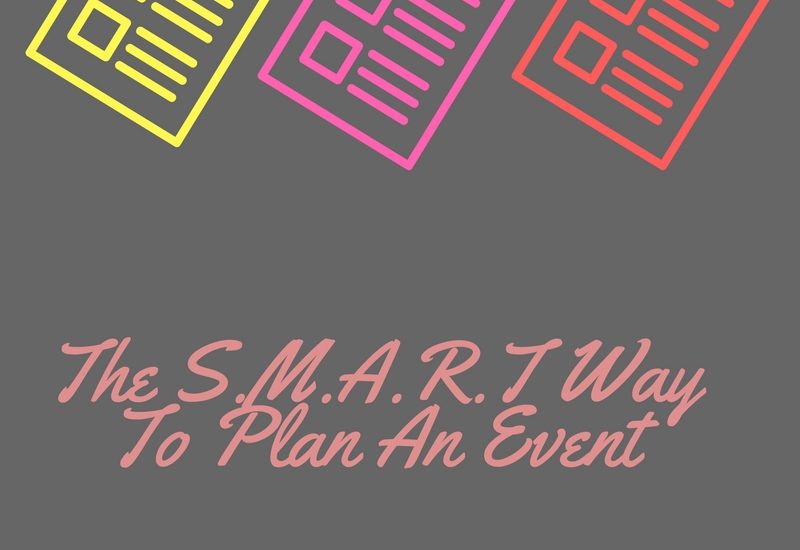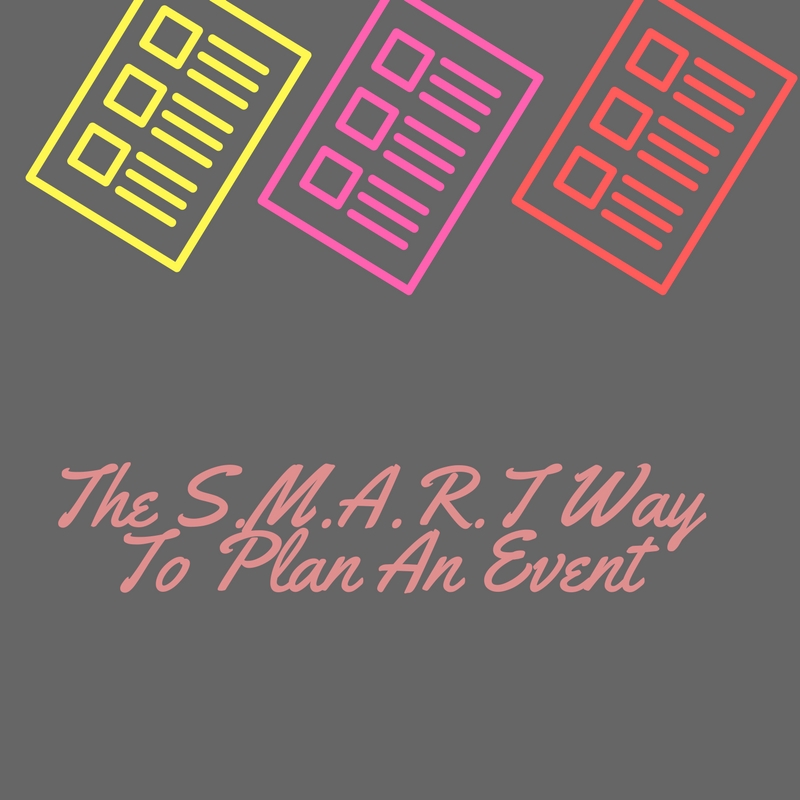The S.M.A.R.T Way To Plan An Event By: Rae Ferrer


I’ve planned my fair share of events over the years in college (for campus organizations, internships, work), and each time I learn something new. I’ve gotten a variety of perspectives from the different events and roles that I’ve encountered. From behind the scenes support positions to managing an entire event, no two roles or events are exactly the same, and that’s the challenge of it all! As someone who enjoys a challenge, I naturally grew to love event planning. The rewarding feeling of accomplishment and satisfaction at the end is just the cherry on top.
I’m currently planning a graduation ceremony at SF State for an organization I’ve been a part of for four years. It’s been one hell of a roller coaster ride, but I’ve developed the following guideline to help keep me on track. If you need to plan a large-scale event yourself, I’m sure this guide will help you successfully execute it!
The most vital component that must be kept in mind throughout the whole process is transparent communication. Just as it’s important in any relationship, transparent communication will ensure that everyone is on the same page. Don’t assume that everyone understands what transparent communication means. Although you would think that it has a universal definition, through my experience, you almost always have to define it to the people you’re working with. As an event manager, get everyone you’re working with to understand what you want and expect from them, and vice versa.
Once that’s laid out, you’re already on to the next step: accountability. It’s important to delegate responsibilities and set deadlines, but as a team, you have to keep each other accountable to make sure things are done in a timely manner. Transparent communication and accountability go hand in hand. You’ll see how important both are in the guide.
1) Set your goals
Before you get into the nitty-gritty stuff for your event, think about the who, what, where, when, why, and how. Who are you trying to get to come to your event? What is the purpose of it? Where will you have it? When will it be? How will you get it done? Some of these questions are straightforward, but others, like the how, are a bit more complicated.
To answer all of them I use a method I learned in high school called SMART.
S stands for Specific. For example, you could easily say “I want my event to be successful.” But what do you actually mean? Instead, change it to “I want twice as many people to attend as last year.” Keep listing everything out. You can’t ever be too specific when it comes to event planning.
M stands for Measurable. This is a good addition to the answer of how? How will you know if/when you’ve achieved your goal? For example, instead of setting a goal of “I want to make profit from my event,” be more specific and use “I want to generate $1,000.00 in profit.” A tip is to set a measurable goal that has multiple outcomes instead of one that will only end one of two ways (success/fail).
A stands for Achievable. This might be obvious, but I’ve found that in the beginning stages of event planning, I tend to be a bit overzealous and feel like Superman. It’s important to be realistic with your goals to ensure that what you and your team is working towards can be achieved.
R stands for Relevant. Only set goals that are relevant to the task at hand. If you find that a goal isn’t a top priority, consider dropping it or changing it completely so that it aligns with your focus.
T stands for Timely. My high school teacher taught me, “a goal is a dream with a deadline.” Setting an endpoint for your goals will help keep you and your team motivated to finishing things in a timely manner. This is where accountability comes into play as well!
Once you’ve gone through this entire process and detailed the finer things, it makes it much easier for you to understand the reasoning behind your entire event. Going back to transparent communication, your team will appreciate it as well.
2) Set a team
As an event manager, your team is your backbone. What positions need to be filled in order to plan this event? In some cases, you have to work with the people you’ve got and it comes down to the delegating tasks evenly. Get to know the people you’re working with. Understand their strengths and weaknesses, and go from there. It’s important to constantly have that transparent communication because not everyone comes to you first. Sometimes, they expect you to approach them. If they feel understood and heard, it develops the working relationship and communication.
Other times, you’ll be able to assemble a group of people to work with. Everything I said earlier applies as well, but what I’ve found in my experience is that creating a team of individuals with a variety of perspectives and skill sets will yield you a much better working collective. It’s important to push friendships aside when choosing. Work and play don’t mix well. Assemble your team according to what they bring to the table and their passion/enthusiasm.
Remember to lead by example. As an event manager, you are the reflection of everyone you’re working with. By getting tasks done early, going above and beyond, and having a great attitude, you’ll see it translate to everyone else.
3) Set a calendar and timeline
This goes back to transparent communication and accountability. Create a timeline of when tasks should be completed, checkpoints, meeting dates, etc. You’ve built a structure with your goals, and now it’s time to create a structure to work from. It’s also crucial that you set up backup plans! Sometimes things don’t always go as planned. So expect the unexpected, and plan accordingly.
Check back on your timeline often, cross things off that have been accomplished, and highlight the things that need more attention. Seeing a visual of everything is much more motivating than simply writing it all down.
4) Keep EVERYTHING
You can never be too organized. Write notes in meetings. Take pictures. Screen shot important emails. Hold on to business cards. You don’t know when you’ll have to look back on things or use them in the future. So keep everything throughout the process, organize them, and know where they are so you’re not scrambling to find something when you absolutely need it. Google Drive is amazing for this.
5) Reflection
I always seem to glaze over this step because of how busy things can get in the midst of planning. But it’s important to take a step back and reflect on your job. What have you done? What do you still have to do? What can you do to make things better? What can you improve on? Take the time to really answer these questions and make gradual improvements rather than drastic ones. Learn from your mistakes. Get feedback from the people you’re working with. Constructive criticism is good criticism.
Lastly…enjoy your event! Bask in your accomplishment and take it all in. Once it’s all done, reflection is the most important step moving forward. Did you achieve your goals? If not, why not? Write these things down, and go over them again when you find yourself planning another event. Before you know it, you’ll be an expert.



